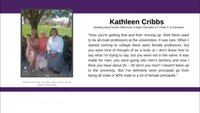| Title |
Cribbs, Kathleen OH19_039 |
| Creator |
Weber State University, Stewart Library: Oral History Program. |
| Contributors |
Cribbs, Kathleen, Interviewee; Tooker, Sarah, Interviewer; Kammerman, Alyssa, Video Technician |
| Description |
The Beyond Suffrage Project was initiated to examine the impact women have had on northern Utah. Weber State University explored and documented women past and present who have influenced the history of the community, the development of education, and are bringing the area forward for the next generation. The project looked at how the 19th Amendment gave women a voice and representation, and was the catalyst for the way women became involved in the progress of the local area. The project examines the 50 years (1870-1920) before the amendment, the decades to follow and how women are making history today. |
| Abstract |
The following is an oral history interview with Kathleen Cribbs, conducted on April 3, 2019 in the Stewart Library, by Sarah Tooker. Kathleen discusses her life, her memories, and the impact of the 19th Amendment. Alyssa Kammerman, the video technician, is also present during this interview.; The following is an audio clip of an oral history interview with Kathleen Cribbs, conducted on April 3, 2019,by Sarah Tooker. In this clip, Kathleen discusses the gender differences she saw in higher education and in public K-12 education. |
| Image Captions |
Kathleen (left), Her mother Hope (middle), and her daughter Sarah (Right) Circa 2015 |
| Subject |
Voting--United States; Women--suffrage; Women--Rights of women; Education, Elementary |
| Keywords |
Voting; Public education; K-12 Education |
| Digital Publisher |
Stewart Library, Weber State University, Ogden, Utah, United States of America |
| Date |
2019 |
| Date Digital |
2019 |
| Medium |
oral histories (literary genre) |
| Spatial Coverage |
Ogden, Weber County, Utah, United States, http://sws.geonames.org/11788968, 41.22809, -111.96766 |
| Type |
Text; Image/StillImage; Image/MovingImage |
| Access Extent |
19 page PDF; Video clip is an mp4 file, 28.9 MB |
| Conversion Specifications |
Filmed using a Sony HDR-CX430V digital video camera. Sound was recorded with a Sony ECM-AW3(T) bluetooth microphone. Transcribed using Express Scribe Transcription Software Pro 6.10 Copyright NCH Software. |
| Language |
eng |
| Rights |
Materials may be used for non-profit and educational purposes, please credit University Archives; Weber State University |
| Source |
Cribbs, Kathleen OH19_039, Weber State University Archives |
| Format |
application/pdf; video/mp4 |
| ARK |
ark:/87278/s67fjz8m |
| Setname |
wsu_bs_oh |
| ID |
105452 |
| Reference URL |
https://digital.weber.edu/ark:/87278/s67fjz8m |
| Title |
Cribbs, Kathleen OH19_039 |
| Creator |
Weber State University, Stewart Library: Oral History Program. |
| Contributors |
Cribbs, Kathleen, Interviewee; Tooker, Sarah, Interviewer; Kammerman, Alyssa, Video Technician |
| Description |
The Beyond Suffrage Project was initiated to examine the impact women have had on northern Utah. Weber State University explored and documented women past and present who have influenced the history of the community, the development of education, and are bringing the area forward for the next generation. The project looked at how the 19th Amendment gave women a voice and representation, and was the catalyst for the way women became involved in the progress of the local area. The project examines the 50 years (1870-1920) before the amendment, the decades to follow and how women are making history today. |
| Abstract |
The following is an oral history interview with Kathleen Cribbs, conducted on April 3, 2019 in the Stewart Library, by Sarah Tooker. Kathleen discusses her life, her memories, and the impact of the 19th Amendment. Alyssa Kammerman, the video technician, is also present during this interview. |
| Image Captions |
Kathleen (left), Her mother Hope (middle), and her daughter Sarah (Right) Circa 2015 |
| Subject |
Voting--United States; Women--suffrage; Women--Rights of women; Education, Elementary--United States |
| Keywords |
Voting; Public education; K-12 Education |
| Digital Publisher |
Stewart Library, Weber State University, Ogden, Utah, United States of America |
| Date Digital |
2019 |
| Medium |
oral histories (literary genre) |
| Spatial Coverage |
Ogden, Weber County, Utah, United States, http://sws.geonames.org/11788968, 41.22809, -111.96766 |
| Type |
Text; Image/StillImage |
| Language |
eng |
| Rights |
Materials may be used for non-profit and educational purposes, please credit University Archives; Weber State University |
| Source |
Cribbs, Kathleen OH19_039, Weber State University Archives |
| Format |
application/pdf |
| Setname |
wsu_bs_oh |
| ID |
105593 |
| Reference URL |
https://digital.weber.edu/ark:/87278/s67fjz8m/105593 |





